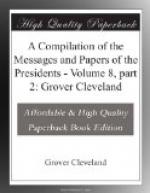This event, so distressing to all our fellow-citizens, must be peculiarly heavy to you, who have long been associated with him in deeds of patriotism. Permit us, sir, to mingle our tears with yours. On this occasion it is manly to weep. To lose such a man at such a crisis is no common calamity to the world. Our country mourns her father. The Almighty Disposer of Human Events has taken from us our greatest benefactor and ornament. It becomes us to submit with reverence to Him who maketh darkness His pavilion.
With patriotic pride we review the life of our Washington and compare him with those of other countries who have been preeminent in fame. Ancient and modern names are diminished before him. Greatness and guilt have too often been allied, but his fame is whiter than it is brilliant. The destroyers of nations stood abashed at the majesty of his virtue. It reproved the intemperance of their ambition and darkened the splendor of victory. The scene is closed, and we are no longer anxious lest misfortune should sully his glory. He has traveled on to the end of his journey and carried with him an increasing weight of honor. He has deposited it safely, where misfortune can not tarnish it, where malice can not blast it. Favored of Heaven, he departed without exhibiting the weakness of humanity. Magnanimous in death, the darkness of the grave could not obscure his brightness.
Such was the man whom we deplore. Thanks to God, his glory is consummated. Washington yet lives on earth in his spotless example; his spirit is in Heaven.
Let his countrymen consecrate the memory of the heroic general, the patriotic statesman, and the virtuous sage. Let them teach their children never to forget that the fruit of his labors and his example are their inheritance.
SAMUEL LIVERMORE,
President of the Senate pro tempore.
DECEMBER 23, 1799.
To which the President replied as follows:
UNITED STATES, December 23, 1799.
Gentlemen of the Senate:
I receive with the most respectful and affectionate sentiments in this impressive address the obliging expressions of your regard for the loss our country has sustained in the death of her most esteemed, beloved, and admired citizen.
In the multitude of my thoughts and recollections on this melancholy event you will permit me only to say that I have seen him in the days of adversity, in some of the scenes of his deepest distress and most trying perplexities; I have also attended him in his highest elevation and most prosperous felicity, with uniform admiration of his wisdom, moderation, and constancy.
Among all our original associates in that memorable league of the continent in 1774, which first expressed the sovereign will of a free nation in America, he was the only one remaining in the General Government. Although with a constitution more enfeebled than his at an age when he thought it necessary to prepare for retirement, I feel myself alone bereaved of my last brother; yet I derive a strong consolation from the unanimous disposition which appears in all ages and classes to mingle their sorrows with mine on this common calamity to the world.




